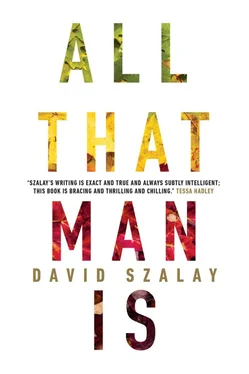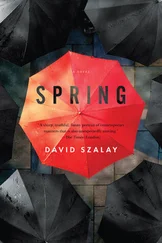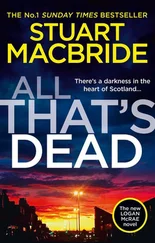Leave Esher. The thought frightens him. Firm things up with Noyer first. Send him a plan — see what he says.
And suddenly the whole thing seems totally speculative, insubstantial. Talk.
Lost Tom again.
Panting slightly, James stands on the trunk of a fallen tree, the huge trunk half-submerged in the ferns. He sees Tom in the midst of them, inspecting something. He is aware of neglecting his son, of not even talking to him much, too preoccupied with his own stuff. His own plans.
This is his life, these things that are happening.
‘Tommy,’ he says.
The boy’s face looks pale, looking up at him from the sea of green ferns.
He has the clear blue eyes of his mother, not his father’s more troubled blue.
The day is windless.
It’s not a joke.
Life is not a joke.
Pearl Dundee, Murray’s mother, died, finally, on Sunday afternoon. The funeral was the following Friday.
Murray himself was late. Heads turned in the pews when he opened the cumbersome door of the crematorium chapel. It was bleak and pale in the chapel. Outside it had started to rain again. The minister, who had been speaking, had been saying something about ‘a long, full life’, waited for Murray to find a place.
Afterwards, while they stand outside, he explains to his sister Beckie that his flight from London was delayed.
‘Well, I told you,’ she says, impatient with him, ‘you’d’ve done better to come up last night.’
They are both dressed as if for the office, in dark suits. Murray in a murky tie. He offers her a cigarette and she takes one, and then they accept the condolences of some old lady — a friend of their mother’s, he thinks she must be, who Beckie seems to know. Mauve-hatted, the old lady tells him, as he lights his cigarette, that his mother was ‘a wonderful woman’.
‘Aye, thanks,’ he says, and sees his brother, Alec, emerging into the last day of September, the falling leaves, the shining wet tarmac. He has not spoken to Alec yet.
He has not spoken to Alec for years.
It seems he doesn’t own a suit, Alec — over his white polyester shirt, his black polyester tie, he is wearing a dark blue Puffa jacket. He’s almost unrecognisable, he’s lost that much hair since Murray last set eyes on him.
‘How’s young Alec?’ he says to Beckie. He says it with a smile, trying to be nice. ‘He’s put on a pound or two, anyway.’
‘Why don’t you ask him?’ she suggests.
Murray is still smiling, sort of, as she moves away, to talk to someone else.
Alec is talking to someone else as well, is filling the doorway of the chapel in his Puffa jacket so that the last few people left inside are having to wait. No one seems to want to ask him to move, to step aside to let them leave. It’s his mother’s funeral, that’s probably why.
Smoking hard, Murray turns to the road. The taxis are arriving, to take them to Beckie’s house for the drinks.
He shares a taxi with some old people.
One of them, an old man with smelly breath, old man breath, seems to know him.
‘So how are you, Murray?’ he asks, tightly holding the moulded plastic handle of an aluminium walking stick.
‘I’m okay, fine,’ Murray tells him. ‘Well, you know,’ he adds, ‘it’s a sad day and all.’
‘It is,’ the old man agrees. ‘Pearl,’ he says, ‘was a lovely creature.’
Murray moves his black leather shoes, and his eyes shift nervously to the sliding streets, the grey faces of the houses. Motherwell. It has been a long time since he was up here. Motherwell? No, actually. She passed away. The old man asks him something.
‘No, I don’t live in the UK now,’ he says.
‘Croatia,’ he says, in answer to another question from the old man.
‘Yugoslavia, it used to be part of,’ he says, in answer to another.
—
In his sister’s small house, even with all the people there, he is unable to avoid an encounter with Alec.
He is in the kitchen, tearing open another lager, when Alec is suddenly there — he’s helping out, seeing to it that everyone has a drink, passing round the peanuts. ‘Hello, Murray,’ he says.
‘Alec. Hello…’
‘You still voting Tory?’ Alec wants to know. His face has an upsetting fullness, a middle-aged quality. The shiny pink forehead is huge.
‘Tory?’ Murray says, and slurps from his lager. ‘Nah, those fuckers are too left wing for me now.’
Alec smiles extremely thinly. ‘How are ya anyway?’ he asks, without much interest.
‘I’m okay,’ Murray says. ‘I’m well.’ Then, for want of anything else to say — ‘You still with the union?’
‘I am. What about you?’
‘This and that,’ Murray offers. ‘I’m not based in this country any more.’
‘No, I heard.’
‘Not for a few years.’
‘Some sort of tax exile, are ya?’
Murray smiles, liking the sound of that — liking the sneer in Alec’s voice when he says ‘tax exile’. He has another slurp of lager. ‘Something like that,’ he tells him.
—
He spends the night in Beckie’s spare room. It was her son’s. He’s left home now, is in Australia or somewhere. (What was his name again?)
‘Why don’t we try and stay in touch?’ Beckie suggests the next morning, early, as they drink tea in the kitchen and he waits for his taxi to the airport.
‘Definitely,’ he says, trying not to look at her. When he does, he thinks — Fuck, she looks haggard .
‘You’re sure you don’t want any breakfast?’ she asks.
‘No.’ Less than two years older than me, and look at her. She looks like an old lady .
She says, ‘You look tired.’
‘Do I?’
‘I suppose you didn’t sleep well,’ she says, ‘in Ewen’s room.’
Ewen — that’s it . ‘I slept okay,’ Murray says, thinking greyly of the hours he endured during the night, turning and turning under the Spider-Man duvet in his Y-fronts and vest. The heating turned up too high. The sound of the rain on the window, like someone muttering unpleasant truths. And the photo. In a frame in the upstairs hall. Himself, Murray, at about ten years of age, with Max, the Alsatian they’d had then, that he’d loved so much. Seeing that photo last night, of himself and the dog, had upset him somehow.
‘I slept okay,’ he says again.
‘Lucky you,’ Beckie says. ‘I didn’t.’
Milky tea. Too milky. The dregs, not even tepid, disgusting him.
‘I couldn’t stop thinking,’ she says.
Murray puts down the mug, and tries to swallow what is in his mouth. He is in his suit again, tie in his pocket.
Beckie is in her dressing gown.
‘I just couldn’t stop thinking,’ she says.
Yesterday, when everyone had left, she told him about their mother’s last days. She hadn’t shed a tear then, telling him the hospital stories — the meetings with doctors, the small-hours vigils, the hopeless dawns. She told him about them in the dry voice she probably uses in her office at the town hall. And he had listened without emotion, without feeling anything.
Now it seems she might break down.
Her mouth wobbles.
Murray, instinctively, looks away.
He looks at the window, straight out through that window with mould in its corners, to the dull morning.
And aye, Beckie is in tears now. Holding a dishcloth over her face.
Where the fuck , Murray thinks, looking at the fake Rolex that hangs too loosely on his sallow wrist, is that fucking taxi ?
—
Twenty-four hours later, on Sunday morning, he is on a train to Stansted airport, and he feels very much worse.
Rainey was involved. Once they had worked together in telephone sales, him and Paul Rainey — they had spent years together on sales floors, under the strip lighting. Working the phones. The Pig worked with them for much of that time, and he was with them on Saturday night as well. They started in the Penderel’s Oak in the middle of the afternoon. Ended up at the Pig’s flat in Whitechapel about twelve hours later. Murray had slept for an hour or two on the floor of the Pig’s sitting room, on the sofa cushions, in his suit. Then it was up at six — with an implausible pain in his skull — to make the lonely walk to Liverpool Street, and the train to Stansted.
Читать дальше












